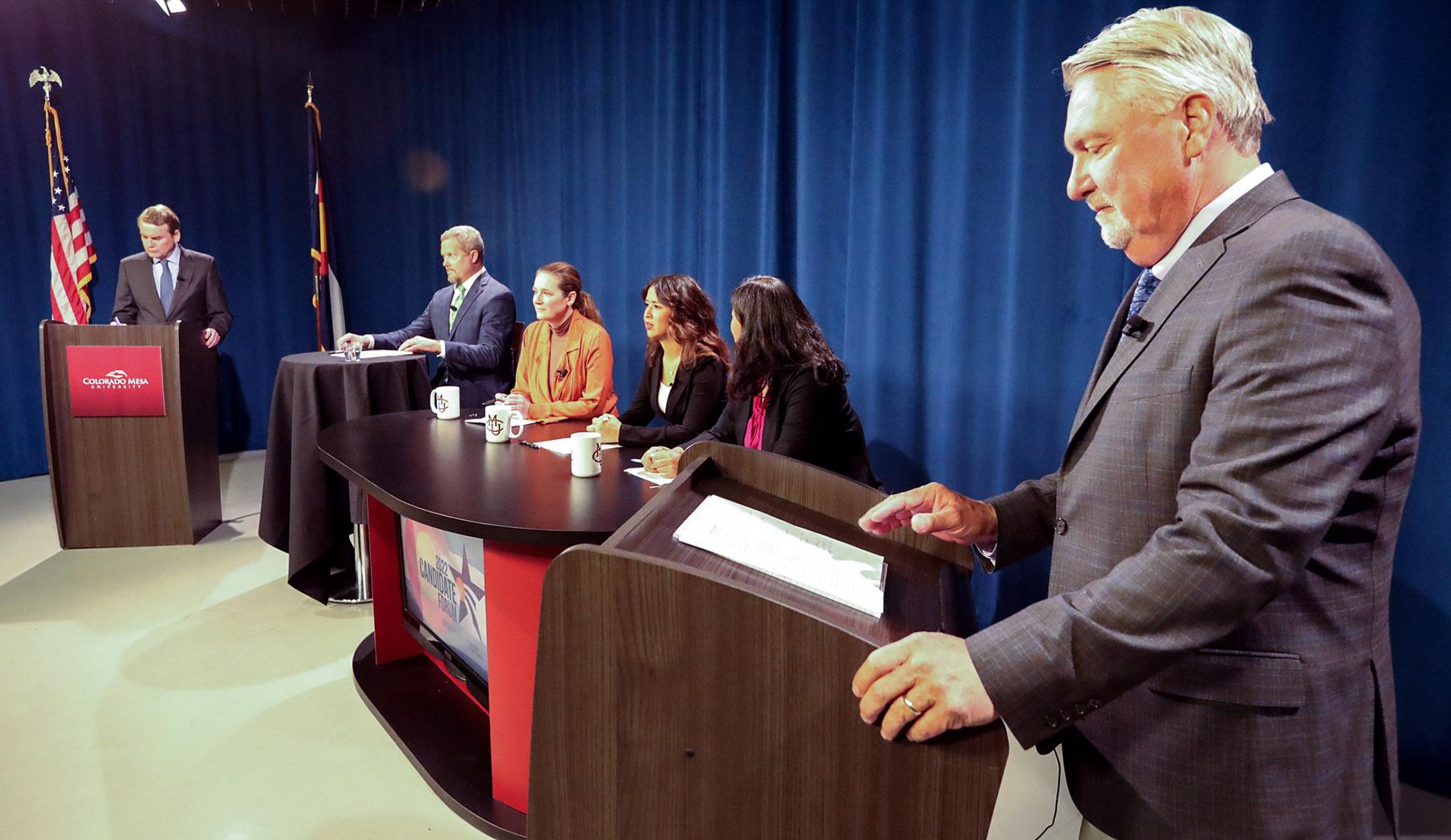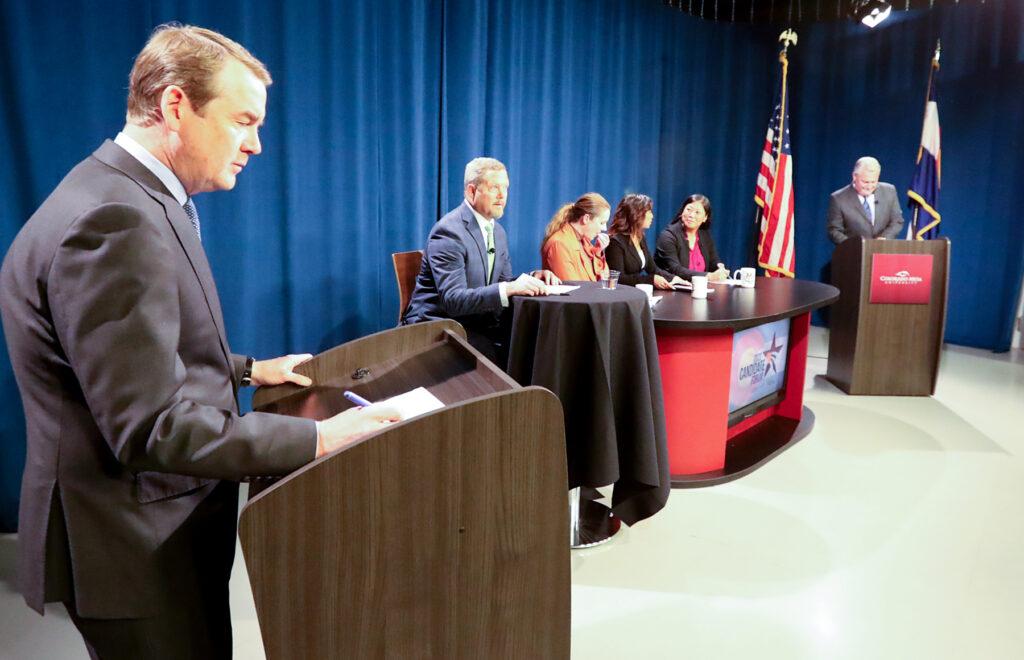
Democratic Sen. Michael Bennet and his Republican challenger, businessman Joe O’Dea, each made their case for why they would best represent the state in Congress at a debate at Colorado Mesa University Tuesday night.
The forum was hosted by CMU, along with Colorado Public Radio and the Grand Junction Daily Sentinel. Democratic Gov. Jared Polis and his Republican challenger, Heidi Ganahl, debated just prior.
The focus of the hour-long event was largely on western Colorado issues — from water and energy to immigration and infrastructure.
The race has generated national attention as O’Dea looks to pull off an upset against the incumbent and help his party gain control of the Senate. It most recently garnered headlines when former President Donald Trump weighed in, lashing out after O’Dea repeatedly criticized him. Trump called it a “big mistake” for Florida Gov. Ron DeSantis to endorse O’Dea.
But that drama was generally absent from Tuesday’s forum. The two candidates even managed to agree on a few points, such as the need to speed up the federal permitting and regulatory process for building infrastructure projects.
Both men also talked about the lack of civility in public discourse and their belief that the two-party system is broken.
“We spend way too much time arguing,” said O’Dea. “We need to start figuring out what it is we agree on, and we need to start moving those kinds of policies forward.”
While Bennet agreed with O’Dea that Congress needs fixing, he argued that he isn’t part of the problem. “I have not contributed to the toxic atmosphere that's there in the time that I've been in the Senate. I never have, because I don't think it's going to move the country forward.”
On the need for immigration reform:
Whether it’s the agriculture or hospitality industry, Colorado, like many other states, depends on migrant labor as a critical part of the workforce. But getting visas to bring in workers can be onerous, unreliable and insufficient. The candidates were asked how they would try to fix this situation, given that Congress appears to lack the will to move forward with larger immigration reform policies.
Bennet noted that in 2013 he was part of the so-called Gang of Eight that crafted a comprehensive immigration reform package that cleared the U.S Senate and failed in the House.
“It had four elements that I still think are very important — a pathway to citizenship for the 11 million people that are here, the Dream Act for people that came here through no fault of their own and know no other country but the United States, (and) all the agriculture provisions, the visas,” said Bennet.
He also said securing $40 billion for border security was critical, but that the country doesn’t need Trump’s “medieval wall.” Instead, Bennet said he wants to see the country deploy “21st-century border security that we developed in Iraq and Afghanistan that would allow us to see every inch of the border.”
For his part, O’Dea said he would back comprehensive immigration reform that included many of those elements.
“It does start with securing our border. I would agree with Senator Bennet,” said O’Dea. “And we also need to provide citizenship to the Dreamers. That's key. And we've got to streamline our immigration system. Currently, it's not working.”
O’Dea blamed partisanship for the gridlock.
"I applaud the fact that he (Bennet) was with the Gang of Eight. But that issue needs to come back up right now. It needs to be run again. I will personally put my name on a bill that does just that.”
On the urban/rural divide:
People living in western Colorado often feel acutely the rural/urban divide and the lack of economic opportunities available in more populated areas along the Front Range.
While both candidates live in the Denver area, their campaigning has taken them all through the state. They were asked about one issue they’ve heard rural voters bring up that Coloradans along the Front Range may not understand.
O’Dea said he frequently hears people talking about the cost of diesel and how much harder it’s made every aspect of their lives.
‘I can't fill up my pickup truck.’ ‘I can't buy groceries.’ ‘I can't pay my rent,’” he recalled. “I ran into a lady in Eaton, Colorado. She came up to me, she pleaded with me. She said, ‘Joe, you gotta win. You've got to help us. I just paid $72,000 to fertilize 300 acres.’ Her fertilizer bill was double this year.”
O’Dea said rural Coloradans need relief from Biden’s “war on energy.”
“If you look at the permits that are actually being drilled on now, they're far less than they were under any other president. And what I'm hearing from rural Colorado is we're detached.”
For his part, Bennet said in the last two years alone he’s traveled 14,000 miles in the state.

“I spend a huge amount of time in rural parts of Colorado, [in] many counties that I will never actually win an election, but I show up over and over and over again,” said Bennet. “What I'm hearing is issues around … hugely expensive housing, an epidemic in mental health, a lack of access to healthcare. And a real concern that rural America is being left behind.”
He pointed to federal legislation that’s aimed at helping communities in northwest Colorado transition as coal plants there close.
“I believe very strongly that if you are a senator representing Colorado, you have an obligation to represent everybody in the state, rural and urban, whether people voted for you, whether they didn't vote for you,” said Bennet.
On what to do about water:
More than a hundred years after it was signed, the Colorado River Compact comes up for renegotiation in 2026. The candidates were asked what they would do at the federal level if the seven member states cannot reach an agreement given the increased needs and decreased flows in the river.
Bennet said the states must reach an accord, and he would like to help with those negotiations.
“Failure is not an option. This is not something for the federal government to determine from Washington, D.C. I think that would be a disaster and very counterproductive,” he said.
Bennet also pointed to $4 billion dollars in drought funding he helped secure in the Inflation Reduction Act, a bill O’Dea opposed. He said the fate of the West depends on finding a way to manage its increasingly scarce water.
“Our entire way of life, from agriculture to our ski resorts to our entire economy, depends on our getting this right. The right role for the federal government to play is to backstop the consensus that the states reach with real federal resources.”
O’Dea said he would like other states to do their part to more fairly allocate water resources.
“Colorado has done an outstanding job of using the water that we have allocated to Colorado,” he said. “We've conserved, we've done our job, but the lower states have not. And we need to push back on California… We need a leader in there that's going to hold California accountable and say, ‘look, the water that you're claiming as a right doesn't exist.’”
He said while Colorado must move forward with long-term water storage projects and make decisions at the local level, the state should also pressure California to ease some of the burden.
“They need to be talking about desalination. They need to be talking about all the water that they have at their beck and call in the ocean that they could bring back up into California and help relieve some of this problem.”
California has started investing more in desalination plants. However, the technology is expensive and can damage marine ecosystems.









